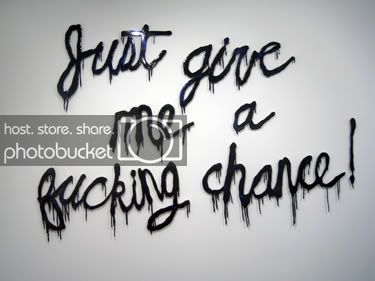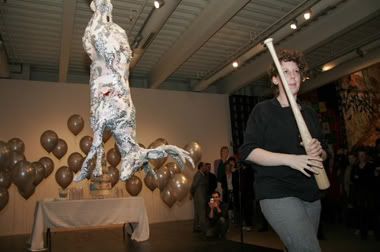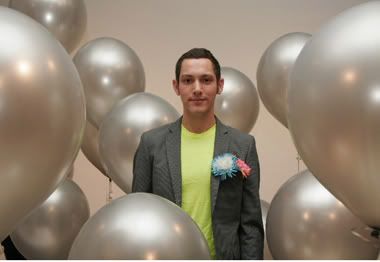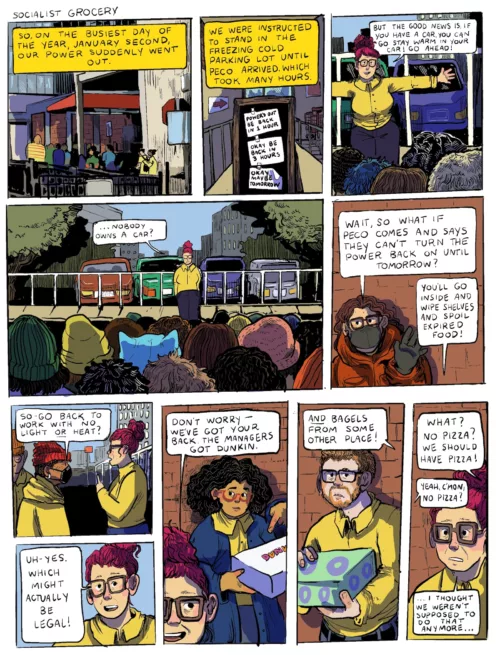Alex Da Corte has an exhibition opening, Love Explosion, on Friday (with Jack Sloss) at Fleisher/Ollman Gallery. It’s not the sort of thing you should miss out on. The text below is the transcripted version of a talk with Alex DaCorte over the hum of traffic outside The Last Drop. If you would like to actually hear that hum, please visit: oneculture.mypodcast.com and download the podcast.
For a quick primer on Alex visit his work on the web, or read this review I wrote not long ago.
IN WHICH THE INTERVIEWER CALLS THE INTERVIEWEE A HUSTLER AND THEY BOTH LAUGH
Annette: I don’t want you to be insulted by my first question but we’ve talked about it before and I think you can handle it.
Alex: Okay.
Annette: I wanted to talk about how people perceive you as a person who plays the “art game” really well, for lack of a better term, a hustler.
Alex: That’s alright I think I’ve used that term myself. It doesn’t insult me.
Annette: So I guess, how do you perceive the way you are going about selling yourself?
Alex: Um.
Annette: I know. That’s a tough one. Do you even think that you’re doing that?
Alex: I think there’s a certain amount of “right place, right time” that is just in life, but you do sometimes have to create those “right places, right times” for yourself by pre-pla–not pre-planning, but by putting yourself out there.
Annette: Do you think that’s an important part of being an artist today?
Alex: No, no, no, no, no, no, no.
. . . But if you’re talking about meeting someone who is interested in you, or is part of an arts world or an arts group?. . . I never was part of any kind of collective in the city. I was around, at most, at first fridays or something. I’m not afraid to ask people for something that I want. For instance, I asked Virgil if he needed an assistant, because when you need work that’s what you do, you ask someone. Did I know that Virgil made work in the city? Yeah. I knew he worked at The Fabric Workshop and all of that stuff, but I was really naive about things like Chelsea, so I wasn’t being opportunistic. I knew he was an art guy who could teach me things.
Even when I met you, I knew you had a gallery so I wanted to show you my work but I don’t know if that’s. . . I know that’s part of making art but you still need to be in your studio working and things like that.
It flip flops. Then they’ll be months and months where no one sees me, because I’m in my studio and I’m working on stuff.
Annette: Yeah.
Alex: I don’t know If I’m answering your question.

DO YOU HAVE TO SELL YOURSELF OR SELL YOUR ART?
Annette: I think you did answer my question. I guess I wanted to talk a little bit more about how much do you think a person has to sell themselves and actually make art? How much is that a part of being an artist?
Alex: I know a lot of really great artists who are painfully shy and they really don’t show their work and I think that stops them from making more work because they don’t get it out there.
I really don’t know why my work is out there in the way that it is out there. I guess it all starts to snowball after awhile. You make a name for yourself from show to show, so I don’t think it has to be that aggressive. I don’t think it has to be despicable. I like people so I talk to people.
It is a necessary part. Art is a business, so you have to have a certain amount of. . . business savvy.
Annette: Do you consider yourself a career artist?
Alex: Yeah. I want to do this for the rest of my life. I’m not good enough at anything else.
Annette: This is what you want to do. 24/7 all the time?
Alex: Yeah, for the rest of my life.

Luren Jenison of Copy Gallery wacks Alex’s “This is This” at the Institute for Contemporary Art
IN WHICH ALEX (INTERVIEWEE) PROFESSES HIS LOVE FOR DISNEY
Annette: Your work also has a surface of being really beautiful and it sells itself really well. It’s very pretty, and I think there is a darker underbelly.
I see you embracing a very decadent side of art that’s been embraced by Damien Hirst, or Matthew Barney. . .
Why does that appeal to you?
Alex: I was thinking about this the other day. Growing up I always liked things like Disney, I guess, things that are very slick. Even when I was a little kid I liked things that were really well packaged, it might just be me being a Virgo, but I just gravitated towards things that were tightly put together and constructed, things like Andy Warhol, when I started learning about art.
I think people like Damien Hirst and Matthew Barney, those types of people have a very slick way of approaching art and that was my taste. I like that idea, of something that you toil over for a really long time but it still looks like you bought it.
End part one. Look for part two tomorrow, or listen to it all at: oneculture.mypodcast.com










